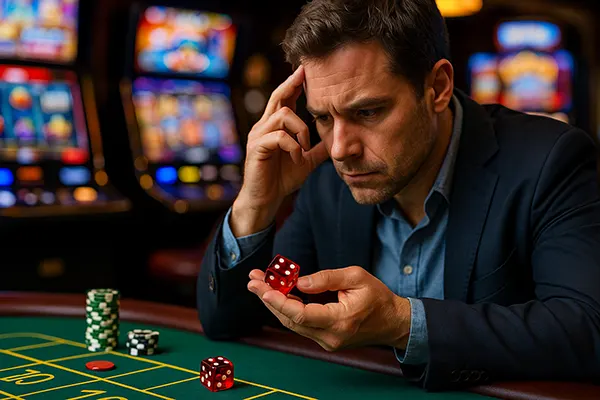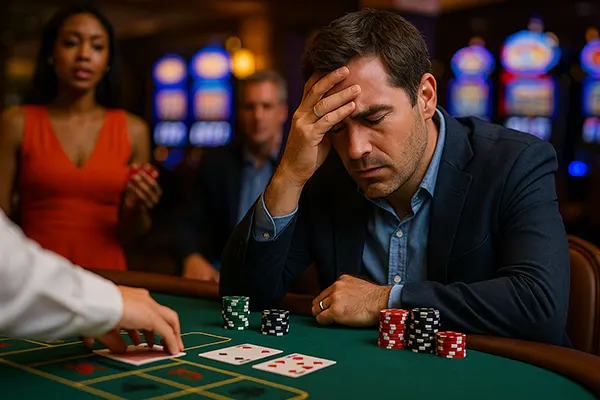The Illusion of Control in Gambling: How Players Overestimate Their Influence on Randomness

Many gamblers are convinced they can influence the outcome of random games, believing in strategies and rituals that supposedly increase their chances of winning. This phenomenon, known as the illusion of control, is well-documented in psychology and has a profound impact on how individuals approach games of chance. Understanding this illusion is crucial for recognising irrational behaviours and promoting responsible gambling.
Psychological Basis of the Illusion of Control
The illusion of control refers to a cognitive bias where individuals believe they have influence over outcomes that are objectively determined by chance. In gambling, this often manifests when players think that their actions—like how they press a button or when they place a bet—can affect the result. This belief is deeply rooted in human psychology and stems from our tendency to seek patterns and agency even in random events.
Studies show that people are more likely to believe they have control when they are actively involved in the process. For example, rolling the dice themselves makes them feel more in control than if someone else rolls it. This active engagement creates a false sense of influence, even though the probabilities remain unchanged.
Gambling environments are designed to exploit this bias. Elements such as near-misses, bonus features, and interactive animations all contribute to reinforcing the player’s perception of control. This not only enhances engagement but also increases the time and money spent playing.
Examples from Real Gambling Behaviour
One of the most evident cases is in slot machines. Players often believe that stopping the reels manually at the “right” time can lead to a win, even though the result is determined by a random number generator the moment the spin begins. This action-based illusion is extremely common and fuels repeated play.
In sports betting, players frequently think their knowledge of teams and statistics gives them an edge, blurring the line between skill and chance. While some sports wagers involve informed decisions, many outcomes remain unpredictable and beyond the bettor’s control.
Even in games like roulette, some gamblers prefer specific numbers or sequences, assuming they have better odds based on previous spins. This neglects the independence of each spin and highlights how easily our brains can misinterpret randomness.
Impact on Gambling Habits and Risk Perception
The illusion of control significantly contributes to excessive gambling behaviour. When players overestimate their influence, they are more likely to continue playing, believing they can “beat the system” or recover losses through skill or persistence. This persistence often leads to longer sessions and greater financial losses.
Moreover, this belief distorts risk perception. Gamblers under the illusion of control perceive games as less risky than they actually are, assuming that their choices or strategies reduce the element of chance. This false confidence can result in risky betting patterns and disregard for bankroll management.
Players who believe they can control outcomes are also less likely to use responsible gambling tools. Features such as loss limits or session timers may seem unnecessary to someone who believes they can “win it back,” reducing their effectiveness in preventing harm.
Vulnerable Groups and Cognitive Traps
Younger and inexperienced gamblers are particularly susceptible to the illusion of control. Without a clear understanding of probability and randomness, they may rely on anecdotal wins or advice from others, reinforcing misguided beliefs.
Cognitive distortions such as selective memory also play a role. Players remember wins more vividly than losses, reinforcing the idea that they have some form of influence. This mental filtering strengthens the illusion and encourages continued play.
Social influences, such as watching others win or hearing about their “strategies,” further amplify the illusion. This creates a community belief in control, which is difficult to challenge without education and awareness.

Reducing the Harm through Awareness and Education
Combating the illusion of control begins with raising awareness. Education about the mechanics of games, the role of randomness, and the nature of cognitive biases can empower players to make more informed decisions. When individuals understand they cannot influence outcomes, they are more likely to adopt healthier gambling behaviours.
Responsible gambling campaigns should directly address this bias. Messages that debunk myths—like “the machine is due for a win” or “your turn is coming”—can reduce the power of superstitions and false strategies. Using real-world examples and data can also enhance the message’s credibility.
Operators can contribute by designing more transparent games and providing information about how results are generated. Displaying the odds, outcomes history, and RNG disclaimers can help diminish the sense of control and reinforce the randomness of each game round.
Tools and Support Systems That Help
Gamblers benefit from tools that promote reflection, such as game history trackers, loss calculators, and reality checks. These features provide data that counters the illusion and encourage a more rational approach to gaming.
Support services and hotlines should be promoted within gambling environments to offer immediate help. When players realise their beliefs about control are harming them, access to counselling or support can make a critical difference.
Community education—through schools, media, and public health initiatives—can also change perceptions over time. By addressing the illusion of control early, it’s possible to reduce the development of harmful gambling habits.
